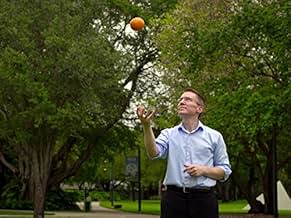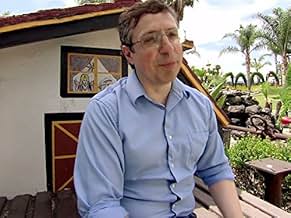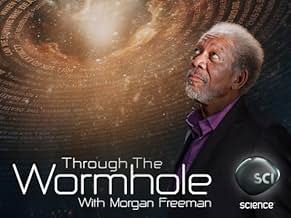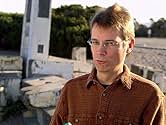Morgan Freeman: Mysterien des Weltalls
Originaltitel: Through the Wormhole

clip wiedergeben2:04
Through The Wormhole: The Dawn Of A New Era For Humanity ansehen
Durch das Wurmloch werden die tiefsten Geheimnisse der Existenz erforscht - die Fragen, die die Menschheit seit Ewigkeiten verwirren. Woraus sind wir gemacht? Was war vor dem Anfang da?Durch das Wurmloch werden die tiefsten Geheimnisse der Existenz erforscht - die Fragen, die die Menschheit seit Ewigkeiten verwirren. Woraus sind wir gemacht? Was war vor dem Anfang da?Durch das Wurmloch werden die tiefsten Geheimnisse der Existenz erforscht - die Fragen, die die Menschheit seit Ewigkeiten verwirren. Woraus sind wir gemacht? Was war vor dem Anfang da?
- Für 2 Primetime Emmys nominiert
- 4 Nominierungen insgesamt
Folgen durchsuchen
Zusammenfassung
Reviewers say 'Through the Wormhole' is lauded for its exploration of advanced scientific theories and Morgan Freeman's narration. It delves into quantum mechanics, the multiverse, and consciousness. However, critics note a lack of skepticism, blending speculative theories with established science, and occasional pseudoscience. Some find it thought-provoking and educational, while others argue it oversimplifies complex topics and presents misleading information. The series is also critiqued for its approach to religious and philosophical questions, often merging science with spirituality.
Empfohlene Bewertungen
All series on the topic of astronomy and cosmology must and will be measured to that watershed event of the early eighties, "Cosmos" by Carl Sagan, which left me with clarity of what we knew, and the relevant questions yet to be answered at the time.
A magisterial Morgan Freeman guides each episode by asking fascinating and timely questions, then allowing experts to answer them.
The result feels too all-over-the-map, sometimes patronizingly simple, then suddenly, as if taken for granted, skipping over crucial logical stepping stones in the explanation process. "Through The Wormhole" suffers from too many people with different verbal styles (and varying verbal skills) to follow a coherent thread of an idea from beginning to end, the way Mr Sagan did so masterfully back in the day.
Then there's a certain something Discovery Channel Influence, with episodes titled along the lines of "Is There A God?", which Mr Sagan would have found sensationalistic. And I agree with Mr Sagan.
Bottom line: As a passionate follower of astronomy since the early eighties, I watch "Through The Wormhole", but in 2012 I prefer my astrophysics/cosmology shows hosted by Neil DeGrasse Tyson, or Brian Cox.
A magisterial Morgan Freeman guides each episode by asking fascinating and timely questions, then allowing experts to answer them.
The result feels too all-over-the-map, sometimes patronizingly simple, then suddenly, as if taken for granted, skipping over crucial logical stepping stones in the explanation process. "Through The Wormhole" suffers from too many people with different verbal styles (and varying verbal skills) to follow a coherent thread of an idea from beginning to end, the way Mr Sagan did so masterfully back in the day.
Then there's a certain something Discovery Channel Influence, with episodes titled along the lines of "Is There A God?", which Mr Sagan would have found sensationalistic. And I agree with Mr Sagan.
Bottom line: As a passionate follower of astronomy since the early eighties, I watch "Through The Wormhole", but in 2012 I prefer my astrophysics/cosmology shows hosted by Neil DeGrasse Tyson, or Brian Cox.
I used to love this show. It revealed fascinating developments at the forefront of neuroscience, genetics, exobiology, and so forth.
It has degenerated to nearly useless. I shall provide an example drawn from this evening's new episode, "Do We Live in the Matrix?" whereby it is opined--and, ostensibly, justified--that we could very well be living in a computer simulation.
We meet a renowned Swiss AI expert. He tells us there's no need to express pi in so many zillions of digits that wrap around the globe ad infinitum: we can just put "C/d"--where, of course, C is circumference and d is diameter.
Uh . . . the difference is that the first one is practical (I can measure off 3.14159... inches.) The other is purely notational (I cannot measure off C/d inches.)
The same expert tells us that, "I can express the entire universe in ten lines of code," and beams with pride as he presents an extremely vague and general algorithm in an ALGOL-like PDL.
Uh . . . in a suitably high-level language, I can express the entire universe in ONE SYMBOL of code. SO WHAT: what PRACTICAL, IMPLEMENTABLE purpose is accomplished?
Another scientist shows some symmetric matrices to mathematicians without any commentary and is disappointed that they don't get excited. When he builds corresponding models of atomic structures, then everyone's excited.
Perhaps if he had TOLD them they were looking at symmetric spin tensors within a Lie algebra, they would have achieved a meaningful apotheosis. Instead, we hear snippets of some meaningless argument about bits and bytes and shmits.
(I recall from a previous episode--although it's in the same vein--that some physicist claimed that, if he builds such and such a fiber optic circuit, he can go backwards in time by 10 to the -18 seconds. I presume that even a physicist realizes that this is completely unmeasurable and thus unverifiable: sending the data from the measuring device to the managing computer takes literally billions of times longer than the 10 to the -18 seconds putatively recovered. I know, I know, physicists pooh-pooh anything that isn't physics as beneath them, but I don't think that's the issue here.)
I SEE WHAT THE PROBLEM IS HERE: the producers of the show have ZERO understanding of the concepts being discussed, Morgan Freeman's golden throat notwithstanding. This, combined with the PERPETUAL problem that participating experts in TV shows experience, viz., that pieces and snippets of their cogent essays are quoted out of context, results in a stream of meaningless dribble that endeavors to sound technical in its misapplied terminological splendor but ends up delivering just so much imbecility in sheep's clothing, albeit dressy and richly ornamented.
What a PROFOUND disappointment!
(FYI, the popular go-back-in-time theme is utterly impossible. This is trivially easy to demonstrate. Suppose I set a box on my kitchen table and send it into the past. IT WOULD HAVE BEEN THERE YESTERDAY! Case closed.)
It has degenerated to nearly useless. I shall provide an example drawn from this evening's new episode, "Do We Live in the Matrix?" whereby it is opined--and, ostensibly, justified--that we could very well be living in a computer simulation.
We meet a renowned Swiss AI expert. He tells us there's no need to express pi in so many zillions of digits that wrap around the globe ad infinitum: we can just put "C/d"--where, of course, C is circumference and d is diameter.
Uh . . . the difference is that the first one is practical (I can measure off 3.14159... inches.) The other is purely notational (I cannot measure off C/d inches.)
The same expert tells us that, "I can express the entire universe in ten lines of code," and beams with pride as he presents an extremely vague and general algorithm in an ALGOL-like PDL.
Uh . . . in a suitably high-level language, I can express the entire universe in ONE SYMBOL of code. SO WHAT: what PRACTICAL, IMPLEMENTABLE purpose is accomplished?
Another scientist shows some symmetric matrices to mathematicians without any commentary and is disappointed that they don't get excited. When he builds corresponding models of atomic structures, then everyone's excited.
Perhaps if he had TOLD them they were looking at symmetric spin tensors within a Lie algebra, they would have achieved a meaningful apotheosis. Instead, we hear snippets of some meaningless argument about bits and bytes and shmits.
(I recall from a previous episode--although it's in the same vein--that some physicist claimed that, if he builds such and such a fiber optic circuit, he can go backwards in time by 10 to the -18 seconds. I presume that even a physicist realizes that this is completely unmeasurable and thus unverifiable: sending the data from the measuring device to the managing computer takes literally billions of times longer than the 10 to the -18 seconds putatively recovered. I know, I know, physicists pooh-pooh anything that isn't physics as beneath them, but I don't think that's the issue here.)
I SEE WHAT THE PROBLEM IS HERE: the producers of the show have ZERO understanding of the concepts being discussed, Morgan Freeman's golden throat notwithstanding. This, combined with the PERPETUAL problem that participating experts in TV shows experience, viz., that pieces and snippets of their cogent essays are quoted out of context, results in a stream of meaningless dribble that endeavors to sound technical in its misapplied terminological splendor but ends up delivering just so much imbecility in sheep's clothing, albeit dressy and richly ornamented.
What a PROFOUND disappointment!
(FYI, the popular go-back-in-time theme is utterly impossible. This is trivially easy to demonstrate. Suppose I set a box on my kitchen table and send it into the past. IT WOULD HAVE BEEN THERE YESTERDAY! Case closed.)
I have seen both the first and second seasons of this excellent series. It explores topics ranging from eternal life to multiple dimensions, with host Morgan Freeman clearly both interested and knowledgeable in the topic he is discussing. The scientists who appear throughout the show are a mix of the current leaders and some of the up-and-comers in quantum theory and astrophysics.
The common thread running through virtually every episode is the Theory of Quantum Mechanics, and this series will be all the more interesting to you if you have some idea of how modern science works. A Scientific Theory is not a "guess," an "assumption," or a "belief." Theories are based on hard evidence, and are put to the test every day by a world full of scientists who would love to prove one of the big ones wrong. Keep in mind that Gravity is still only a Theory because we can only observe its effects on other things; you still can't see it or directly measure it, even with our high technology.
Quantum mechanics is the dominant theory in modern science because it has been validated by every test thrown at it so far. What this series covers are those many tests and trials, as well as the ideas on the horizon, with each hour long episode dedicated to a particular deep philosophical question. Scientists with competing ideas are allowed to explain their work, and cover many of the new frontiers such as String Theory, Nanotechnology, Multidimensionality, the Multiverse, and even what Consciousness truly is.
Typically science documentaries made in America are not as good as those from the BBC, Europe, or Japan because American shows have to cater to a majority that sadly still fails to accept even evolution. Despite my reservations, Through The Wormhole is bar none the best science documentary series I have seen, as well as the most current in terms of the cutting-edge scientific community.
The production value is very high, with many stunning visual representations of the concepts being discussed. The video is HD and scenes are framed and shot more like a film than a standard television documentary. It even has its own original music rather than stock. They clearly went all out in making this the best it could be.
If you have an open and curious mind I can't think of a better series to recommend. This is a show for people who aren't afraid to ask the big questions, and who are willing to be left with even bigger ones after watching the series. Through the Wormhole will certainly broaden your horizons.
The common thread running through virtually every episode is the Theory of Quantum Mechanics, and this series will be all the more interesting to you if you have some idea of how modern science works. A Scientific Theory is not a "guess," an "assumption," or a "belief." Theories are based on hard evidence, and are put to the test every day by a world full of scientists who would love to prove one of the big ones wrong. Keep in mind that Gravity is still only a Theory because we can only observe its effects on other things; you still can't see it or directly measure it, even with our high technology.
Quantum mechanics is the dominant theory in modern science because it has been validated by every test thrown at it so far. What this series covers are those many tests and trials, as well as the ideas on the horizon, with each hour long episode dedicated to a particular deep philosophical question. Scientists with competing ideas are allowed to explain their work, and cover many of the new frontiers such as String Theory, Nanotechnology, Multidimensionality, the Multiverse, and even what Consciousness truly is.
Typically science documentaries made in America are not as good as those from the BBC, Europe, or Japan because American shows have to cater to a majority that sadly still fails to accept even evolution. Despite my reservations, Through The Wormhole is bar none the best science documentary series I have seen, as well as the most current in terms of the cutting-edge scientific community.
The production value is very high, with many stunning visual representations of the concepts being discussed. The video is HD and scenes are framed and shot more like a film than a standard television documentary. It even has its own original music rather than stock. They clearly went all out in making this the best it could be.
If you have an open and curious mind I can't think of a better series to recommend. This is a show for people who aren't afraid to ask the big questions, and who are willing to be left with even bigger ones after watching the series. Through the Wormhole will certainly broaden your horizons.
10stefgrig
Let me get this out of the way . You will not get any answers .
What you will gain by this glimpse into modern science is a measure of awe , at the endless possibilities that our mind can produce , given enough time and motive .
You will gain an infinite number of new questions. How can we ever be sure of what is real and what is in our mind ? How far will the mind go into producing a delusion to satisfy our most fundamental needs ?
This is a great journey into a subject that will never end , research through science and belief to find ourselves , our place in this universe or multiverse .
Highly recommended for many reasons , but most importantly because this journey takes no side , claims no higher truth but one : The search is endless but worth it .
What you will gain by this glimpse into modern science is a measure of awe , at the endless possibilities that our mind can produce , given enough time and motive .
You will gain an infinite number of new questions. How can we ever be sure of what is real and what is in our mind ? How far will the mind go into producing a delusion to satisfy our most fundamental needs ?
This is a great journey into a subject that will never end , research through science and belief to find ourselves , our place in this universe or multiverse .
Highly recommended for many reasons , but most importantly because this journey takes no side , claims no higher truth but one : The search is endless but worth it .
The fact should be mentioned that other reviews have rated this show less than satisfactory due to highly abstract ideas and very inductive thought processes. While this may be a negativity for other science-based shows, it certainly isn't for 'Through the Wormhole'. As the title suggests, the viewer is traveling through a wormhole - which humankind knows little to nothing of. The producers and scientists behind this don't pretend to know everything. While you don't learn many facts with this show, you do learn theories, laws of physics, and how to expand your thinking. Humans as a species tend to be quite narrow minded, and this can be proved through ongoing problems such as segregation, homophobia and radicalism in religion. While this show doesn't touch much on any of these issues, minds are being re-molded to solve problems nonetheless. There's something about learning of things greater than human lives that, if it can fill even one with a spark, will ignite the future generation of minds.
Wusstest du schon
- VerbindungenFeatured in Symphony of Science: The Quantum World (2011)
Top-Auswahl
Melde dich zum Bewerten an und greife auf die Watchlist für personalisierte Empfehlungen zu.
- How many seasons does Through the Wormhole have?Powered by Alexa
Details
- Erscheinungsdatum
- Herkunftsland
- Offizieller Standort
- Sprache
- Auch bekannt als
- Through the Wormhole
- Drehorte
- Ventura, Kalifornien, USA(Studio)
- Produktionsfirmen
- Weitere beteiligte Unternehmen bei IMDbPro anzeigen
- Laufzeit
- 1 Std.(60 min)
- Farbe
- Sound-Mix
- Seitenverhältnis
- 16:9 HD
Zu dieser Seite beitragen
Bearbeitung vorschlagen oder fehlenden Inhalt hinzufügen
































